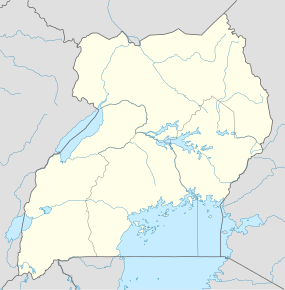Achol-Pii Refugee Settlement
| Achol-Pii Refugee Settlement Acholi-Pii | |
|---|---|
 Achol-Pii Refugee Settlement | |
| Coordinates: 2°39′31″N 33°07′29″E / 2.65865°N 33.12469°ECoordinates: 2°39′31″N 33°07′29″E / 2.65865°N 33.12469°E |
The Achol-Pii Refugee Settlement was a major refugee and IDP camp in present-day Agago District in Uganda. It was one of the earliest and largest camps in Uganda.
Congolese refugees fleeing the Congo Crisis were settled in Achol-Pii in the 1960s.[1]
Achol-Pii was consistently plagued by insecurity, suffering numerous insurgent attacks, the earliest in 1996.[2] In August 2000 the Lord's Resistance Army murdered six Sudanese and abducted three others in two separate raids on the camp.[3] The LRA attacked again in August 2002, killing over 60 refugees and kidnapping four employees of the International Rescue Committee. This attack, cited as the LRA's worst on any IDP camp, led to the closure of Achol-Pii and the transfer of its population to more secure locations west of the Nile River, including Kirgyandongo and Kyangwali.[2]
References
- ↑ Sachs, Guglielmo Verdirame and Barbara Harrell-Bond. With Zachary Lomo and Hannah Garry and a foreword by Justice Albie (2005). Rights in exile : Janus-faced humanitarianism. New York [u.a.]: Berghahn Books. ISBN 1571815260.
- 1 2 Weber, Annette (2003). Abducted and Abused: Renewed Conflict in Northern Uganda (Report). New York: Human Rights Watch. Retrieved 12 June 2016.
- ↑ Country Reports on Human Rights Practices (Report). Bureau of Democracy, Human Rights, and Labor. 23 February 2001.